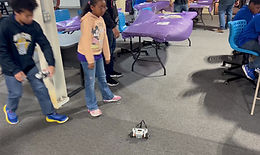Unleashing the Potential: How Community Mentorship is Igniting the Fire in Youth
- Henry Washington

- Nov 16, 2024
- 3 min read
In today's world, where distractions are everywhere and opportunities feel fleeting, young people face unique challenges. They navigate pressures that previous generations did not experience, often feeling uncertain about their future. However, community mentorship shines brightly as a beacon of hope. By learning from experienced mentors, young individuals can find guidance, support, and the motivation they need to unlock their full potential.
Mentorship promotes personal growth while also strengthening the entire community. It creates a cycle of support and inspiration that can lead to lasting change. This blog post will examine the impact of community mentorship on youth development and the best practices to engage mentors. Additionally, we'll discuss how communities can collaboratively create a thriving mentorship ecosystem.
The Impact of Community Mentorship on Youth Development
Community mentorship illuminates the way for youth, shaping crucial skills and building confidence. The relationships formed through mentorship profoundly impact young individuals.
For example, a study by the National Mentoring Partnership found that mentored youth are 55% more likely to enroll in college and 78% more likely to volunteer regularly. These statistics demonstrate the significant advantages mentorship provides. Furthermore, a program in San Antonio reported that students who received mentorship had a 50% higher graduation rate compared to their peers who did not participate.
Mentorship also fosters a sense of belonging. Young people not only acquire knowledge and skills; they also gain emotional support that helps them weather difficult times. This nurturing environment empowers youth to pursue their passions fearlessly, fostering resilience and strong self-identities.

Fostering Meaningful Mentor-Mentee Relationships
Building impactful mentor-mentee relationships requires careful consideration. Here are essential strategies communities can implement to foster these connections:
Identify and Recruit Mentors: Start by finding community members who are eager to share their time and experiences. This could include teachers, business leaders, or retired professionals who can offer valuable guidance.
Training and Support for Mentors: Provide structured training. Equipping mentors with skills in communication and goal-setting can improve their effectiveness. For instance, mentorship training programs in Minneapolis have shown an increase in mentor satisfaction by 40%.
Encourage Open Communication: Create a foundation of trust. Promoting open discussions about aspirations and obstacles helps establish a supportive atmosphere that encourages growth.
Personalize the Mentorship Experience: Tailoring support to each mentee's specific needs is crucial. Developing individualized plans can help address the unique goals of every young person, ensuring they receive the guidance they need.
Create a Safe Space for Vulnerability: Train mentors to cultivate environments where young people feel comfortable expressing themselves. This can lead to profound personal transformations.
Engaging Communities in Mentorship Initiatives
Fostering a strong community mentorship program requires collective effort. Here are some ways communities can actively engage in mentorship:
Organize Mentorship Events: Hosting workshops and seminars helps connect youth with potential mentors, fostering relationships and enhancing community spirit.
Leverage Local Businesses: Encourage businesses to support mentorship initiatives. For example, a collaborative program in Cleveland has seen a 30% increase in employee engagement when companies dedicate resources to community mentorship.
Promote Peer Mentoring: Facilitating mentorship relationships among peers can offer relatable guidance. Older students mentoring younger ones helps develop leadership skills and a sense of community responsibility.
Utilize Technology: The rise of online platforms allows mentors and mentees to connect regardless of geographical constraints. Virtual mentorship can expand access to diverse perspectives and experiences.
Measure and Celebrate Successes: Regularly track the progress of mentorship initiatives. Sharing success stories can inspire others to get involved and contribute to community growth.
Shaping the Future Together
As we look forward, it is clear that mentoring youth is vital for our communities. When we empower young people through mentorship, we invest in the leaders of tomorrow. By providing valuable support and guidance, we can spark a ripple effect that transforms lives and uplift communities.
Mentorship equips young individuals with the skills to chase their dreams, tackle challenges, and succeed. The connections formed today can lead to brighter futures not just for the mentees, but for all of society.
In summary, community mentorship offers invaluable opportunities for collaboration. By working together, we can help ignite the fire in our youth. As we embrace the role of mentors, we also strengthen our communities, fostering a spirit of cooperation and empowerment for future generations. Let us ignite the passions, dreams, and potential of our youth through the powerful gift of mentorship.
Together, we can make a difference. Are you ready to unlock the potential?
By engaging in community mentorship, we create a legacy of support, empowerment, and growth. The youth in our communities are counting on us—let's rise to this challenge and help them shine!









Comments